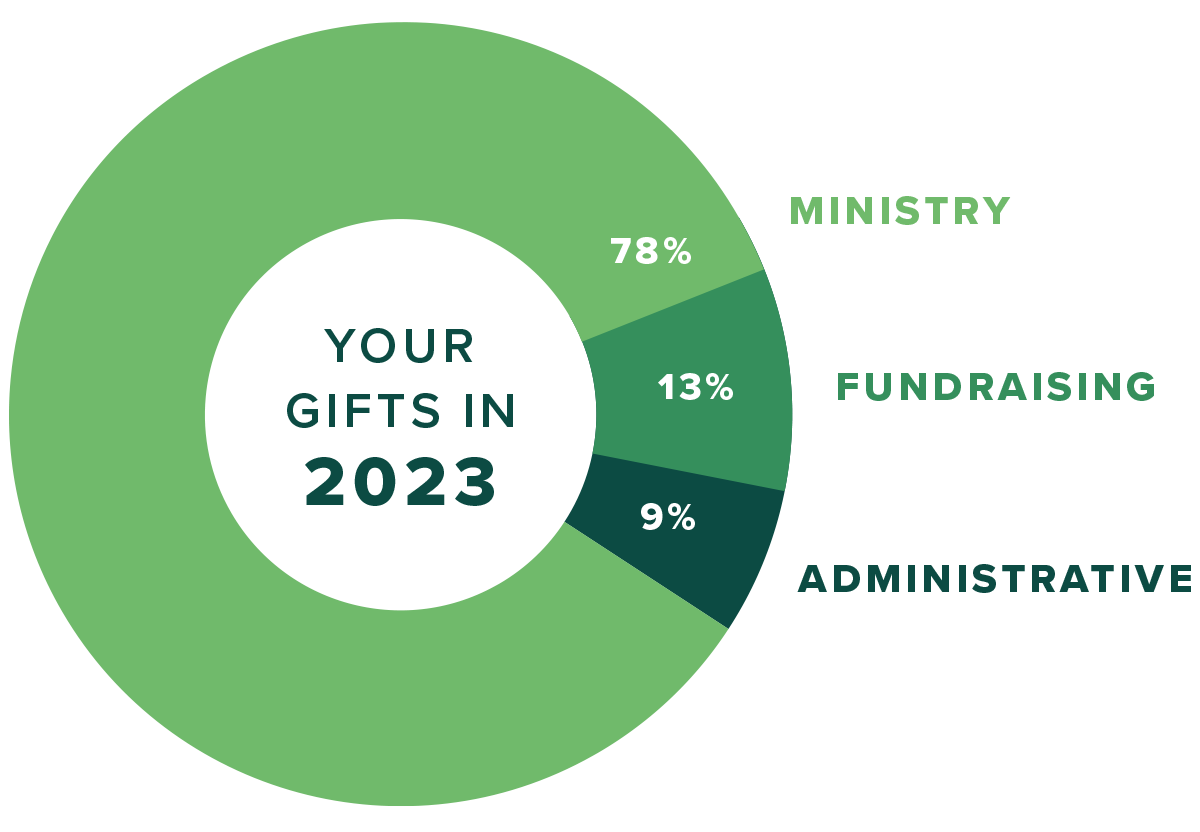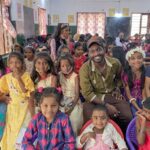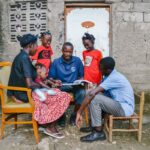A Child Champion in Ethiopia holds weekly coffee ceremonies with moms from her community and uses the opportunity to give them hope.
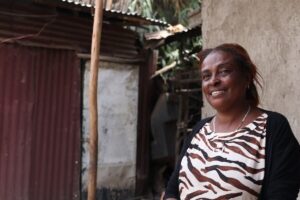
Getenesh, a Child Champion at Akaki Hope Center, hosts a weekly coffee ceremony at the center for mothers of registered kids.
Thursdays at Akaki Hope Center in Addis Ababa, Ethiopia, are usually slightly busier than the rest of the weekdays when moms come into the Hope Center mid-morning.
As they arrive, they hug and exchange greetings outside the classrooms. Thursday is a special day for them. They have a coffee ceremony that is hosted by Getenesh, a Child Champion at the center.
Coffee ceremonies are a big part of Ethiopian culture. In addition to being an important tradition, the ceremony is also a symbol of respect and friendship.
Inside one of the classrooms, plastic chairs are arranged in a semicircle, and at the end of the semicircle is a special wooden chair meant for the host, Getenesh. Coffee cups are neatly arranged on a tray along with popcorn, and that is placed on a mat on the floor.
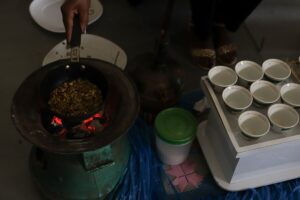
The sweet aroma of roasting coffee beans fills the room where the mothers are gathered.
As Getenesh welcomes the women into the room, a small charcoal stove is lit, and sweet incense is burned. Soon the room is full of the sweet scent.
Getenesh then roasts washed coffee beans on a metal pan and passes it around so that the women can inhale the aroma of the roasted beans.
She then grinds the beans in a traditional mortar, puts the ground coffee in a traditional pot called a jebena with hot water, and then places it on top of the charcoal fire to brew. It could take over an hour for the drink to be ready.
As the coffee brews, Getenesh leads the women in conversation where she begins checking up on each of them as they catch up on what the previous week was like. The moms can share their struggles and feelings with Getenesh knowing she is no stranger to their circumstances.
A Shared Experience
Getenesh is the firstborn of four. As a little girl, she and her family lived in a single room in a poor neighborhood in Addis Ababa. Their household was headed by their mother after their father died.
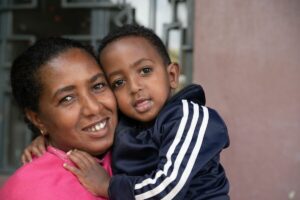
This mom and her child attend the weekly coffee ceremony put together by Getenesh.
Her mom worked as a casual laborer in the wealthy neighborhoods in the city. She would go into the houses to prepare and bake injera, a fermented pancake-like flatbread, and brew traditional drinks.
With the little she earned, Getenesh’s mother could not afford to provide school supplies for her kids. This meant that despite education being free in government schools in Ethiopia, Getenesh and her siblings struggled to attend school because they lacked the necessary supplies.
Their mom sought help from the local church they attended, and so Getenesh was provided with supplies like a school uniform, shoes, and writing materials.
In addition to struggling to meet their school supplies demand, Getenesh says, they also struggled to meet basic needs at home like food and clothes. They seldom had a balanced diet.
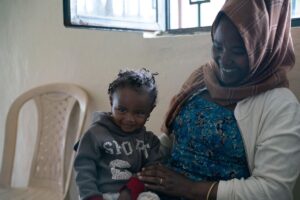
Another mom, holding her child, talks with other mothers about her week.
“We mostly took bread and tea once a day,” Getenesh says. “We would be lucky once in a while to have injera and stew whenever my mom was allowed to carry her leftover food from the houses she worked in.”
As a girl, she recalls going without shoes for a long time.
“My mom could not afford to get me a pair of shoes, so I walked barefooted for a while until one day my grandmother decided to get me a pair,” she says. “She went into the forest, harvested a huge amount of firewood, and walked a long distance to sell just so she could get me a pair of flip-flops.”
Paying It Forward
After high school, Getenesh joined a teachers’ training college where she qualified to be a kindergarten teacher. She taught in a kindergarten in Addis for 15 years before joining the Hope Center.
“From a young age, I knew I wanted to work with children, but beyond that I saw what the church did for me and my siblings and how my pastor devoted his time to mentor, encourage, and cheer us on. This made me want to serve kids because I know what it feels like to have a champion.”
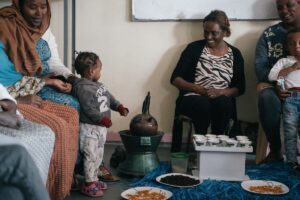
A child at the coffee ceremony is curious about how the beans are roasted.
Getenesh has served children at the Hope Center for 10 years. She says she finds joy in singing, playing games, and teaching children the Word of God.
While serving at the Hope Center, she felt the need to reach out to mothers in her community. This is because as a young mother, Getenesh struggled and had no one to talk to.
Getenesh became a mother while still in high school. Having had a child out of wedlock, she faced a lot of rejection from the community. After college, she got married to the father of her child but later was mistreated and finally realized that the man had another family back in the village. This led to a divorce. She has since raised her two daughters alone.
“I struggled in my early years of motherhood, and some of the sufferings were because of societal norms,” Getenesh says. “This allowed me to understand moms better, and so when I got this burden in my heart to reach out to moms, I prayed for guidance on how best to get to them.”
At the Hope Center, 49-year-old Getenesh got the idea of hosting coffee ceremonies for moms.
A Safe and Accepting Place
Three years ago, she started inviting moms from the community to the ceremony. For Getenesh, the ceremony she hosts is also a safe space for moms to speak openly about their struggles and find solutions.
The moms are from different religious backgrounds, but what they have in common is the hard place they are in.
“Some moms suffer from rejection from their families, some are struggling to raise their kids alone in these tough economic times, some are not sure if they are parenting their kids right, and some have challenges in their marriages,” she explains.
Getenesh says when they meet in groups, she first shares her experiences with them, then allows them time to also share their experiences.
“We listen to each other without prejudice and take that chance to advise and encourage each other. At the end of the ceremony, I also share with them about God’s love and grace. This has helped most of the moms find peace and love and also spread hope to their families and their neighbors,” she says.
The ceremony, Getenesh says, has helped foster relationships among the moms in the community. They are able to encourage and help each other.
“Serving kids and the moms in my community gives me a lot of fulfillment. I am happy when their spirits are lifted and when they are full of hope.”
Your gift to the OneChild Partners Fund will be used where it’s most needed — to bring hope to more kids and families in hard places.
Getenesh talks with moms in her community and encourages them to share about what’s going in their lives.
.
We are accountable to the children we serve AND to our donors.
Our accountability to our donors is one of our highest priorities. Our goal is to use the funds entrusted to us as wise stewards. To do this requires continued monitoring of our fund distribution. OneChild is also a member in good standing with the Evangelical Council for Financial Accountability (ECFA)
